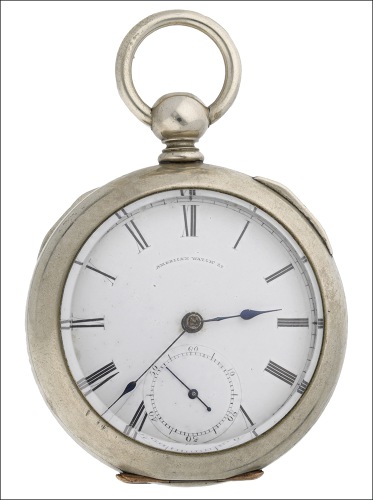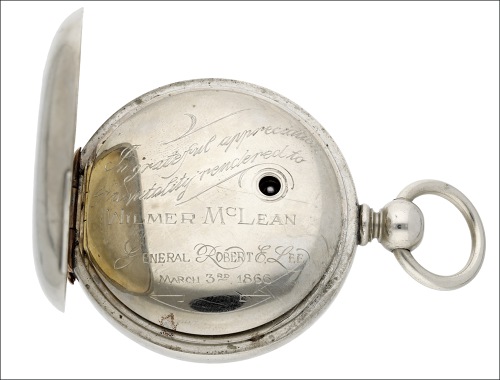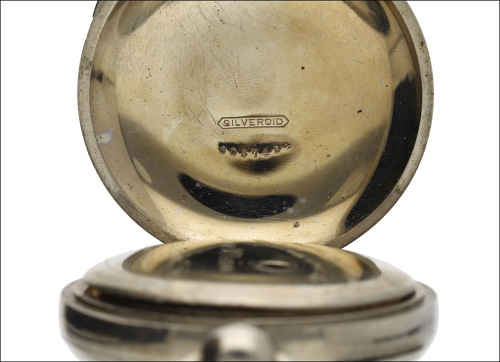Auction Catalogue




American Civil War interest: An American Watch Company presentation pocket watch, the signed white enamel dial with black Roman numerals and subsidiary seconds dial, the jewelled key wound movement signed ‘P.J. Bartlett, Waltham, Mass’ and numbered ‘357354’, the heavy case stamped ‘Silveroid’ and numbered ‘3067464’, the cuvette inscribed:
‘In grateful appreciation of hospitality rendered to WILMER McLEAN
General Robert E. Lee, March 3rd 1866’.
£1,000-£2,000
Provenance: Christies, New York East, 11th May 1999, Sale No 8239, lot 49.
Wilmer McLean (May 1814 – June 1882) was a grocer from Virginia, who holds a unique position in the history of the American Civil War, while General Robert E. Lee (January 1807 – October 1870) was one of the war’s best known commanders, who led the Army of Northern Virginia from 1862 until its surrender in 1865.
------------------------
Prior to the outbreak of the civil war General Robert E. Lee had a 32 year career as an exceptional officer and military engineer in the United States Army, distinguishing himself during the Mexican–American War; However, when his home state of Virginia declared secession from the Union, Lee chose to join the confederate forces.
Lee took command of the Army of Northern Virginia in June 1862, and had successes at the Seven Days Battles and the Second Battle of Bull Run and two decisive victories at Fredericksburg and Chancellorsville. As commander of the Army of Northern Virginia, he fought most of his battles against armies of significantly larger size, and managed to win many of them. In 1863 he launched a second invasion of the North, where he was decisively defeated at the Battle of Gettysburg.
In 1864 General Ulysses S. Grant took command of Union armies and Grant engaged Lee's army in bloody but inconclusive battles at the Wilderness and Spotslvania before the lengthy Siege of Petersburg. Following the capture of Richmond and the destruction of most of his army Lee finally surrendered to Grant on 8th April 1865.
Lee went on to support reconciliation between North and South. He accepted "the extinction of slavery" provided for by the Thirteenth Amendment, but opposed racial equality for African Americans. He died in 1870. Lee enjoys the status of a cultural icon in the South and is largely hailed as one of the Civil War's greatest generals.
------------------------
The initial engagement of the American Civil War in 1861 - First Battle of Bull Run, took place on the Yorkshire Plantation, in Manassas, Prince William County, Virginia, which belonged to Wilmer McLean. McLean's house was being used as a headquarters for Confederate Brigadier General P. G. T. Beauregard, and a cannon ball dropped through the kitchen fireplace.
McLean was a retired major in the Virginia militia but by 1861 was too old to return to active duty. In the spring of 1863, he and his family moved about 120 miles south to a dusty, crossroads community called Appomattox Court House.
On April 9, 1865, General Robert E. Lee was about to surrender to Lieutenant General Ulysses S. Grant, he sent a messenger to Appomattox Court House to find a place to meet. The messenger knocked on McLean's door and requested the use of his home, to which McLean agreed. Lee surrendered to Grant in the parlour of McLean’s house, effectively ending the Civil War. Later, McLean is supposed to have said, "The war began in my front yard and ended in my front parlor.”(sic). Once the ceremony was over, members of the Army of the Potomac began taking the tables, chairs and other various furnishings of the house - essentially anything that was not tied down - as souvenirs.
Withdrawn
Share This Page